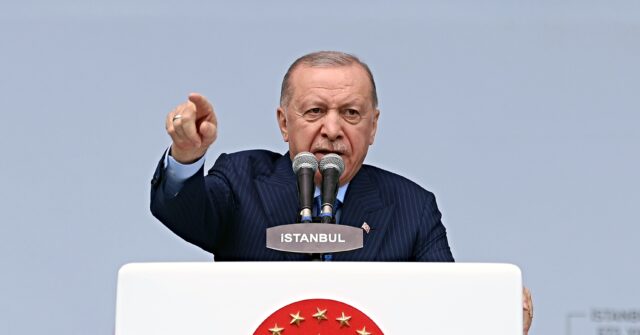Reports on Thursday confirmed that Turkish Islamist strongman Recep Tayyip Erdogan had organized a constitutional committee, featuring ten lawyers and mostly senior members of his Justice and Development Party (AKP), to replace the nation’s current constitution.
Erdogan has spent decades advocating for the replacement of the current constitution, which was implemented in 1982 following a military coup. The current constitution is the fourth to rule Turkey since the fall of the Ottoman Empire and establishment of the Republic of Turkey in 1921. While amended 20 times since Turkey first returned to democracy – and since slid into Islamist authoritarianism under Erdogan – the president and his party have argued that the nature of the government that drafted it makes the document fundamentally flawed.
Among the major changes to the foundational government of Turkey under Erdogan has been the abandonment of a parliamentary system in 2017, which allowed Erdogan to extend his time in power from his prime ministership. Erdogan has ruled Turkey as either prime minister or president since 2003.
The AKP faces vocal challenges in this endeavor from opposition parties, particularly the most prominent secularist opposition party, the Republican People’s Party (CHP). Detractors have expressed concern that Erdogan is seeking to lift term limits on the presidential office to remain in power indefinitely, or that he may amend the first four articles of the constitution, which assert that Turkey is a secular Republic.
Erdogan confirmed that the composition of a constitutional committee was complete and the group would hold its first meeting on June 4.
“I have appointed ten lawyers for this task. I hope that with the work of these friends, we will advance the new constitution process,” the Turkish newspaper Cumhuriyet quoted Erdogan as saying.
Another Turkish newspaper, Hurriyet, confirmed that Vice President Cevdet Yılmaz will lead the committee but noted that “it remains unclear whether Erdogan will personally attend” the first session on June 4. These confirmations followed reports on Wednesday indicating that the creation of the committee was nearly complete and it would begin drafting an entirely new constitution throughout the summer.
The CHP has publicly articulated multiple concerns with the new processing, including accusations that Erdogan has violated the constitution repeatedly, that he may seek to end term limits on the presidency, or that he may amend the first four articles of the constitution. The first three articles state that Turkey is a “democratic, secular, and social state … respecting human rights” and “loyal to the nationalism of [Mustafa Kemal] Atatürk,” the Republic’s founder and the founder of the CHP.
The fourth article states that the first three may never be amended for any reason.
“We cannot work on a constitution with someone who does not recognise the current one,” CHP Deputy Chair Murat Bakan declared last week, condemning the move to replace the foundational document.
“This is the same government that said the Constitutional Court should be abolished, refused to acknowledge its rulings, and kept MP Can Atalay in prison despite a binding court order,” he noted.
The Turkish government regularly imprisons political dissidents on dubious charges. Most recently, Erdogan’s government ordered the arrest of the mayor of Istanbul, Ekrem Imamoglu, on charges of corruption that the CHP rejects as falsified. The CHP nominated Imamoglu as its official candidate for the 2026 presidential election following his arrest in March and has organized protests attracting thousands of people, which Erdogan has dismissed as “street terrorism.”
The CHP is not alone in questioning the reason for Erdogan’s constitutional push. The head of the New Welfare Party (YRP), a minor Islamist fundamentalist party, stated in remarks this week that his party would not support drafting a new constitution if the objective was merely to keep Erdogan in power.
“If we want to make a constitution aimed at getting the President to be elected once again and to facilitate this election … we will be against it,” leader Muhammed Ali Fatih Erbakan told reporters, noting that the current constitution, in his estimation can be modified and improved rather than discarded. Erbakan left open the possibility of cooperation with the AKP on the new constitution in the event that the draft the constitutional committee proposes is “more democratic, libertarian, and … will put human rights even more in the foreground.”
Erdogan addressed concerns that he is seeking to stay in power indefinitely last week, insisting that he had “no interest” in running for any public office ever again. His comments addresses solely the possibility of campaigning and being “re-elected,” however, not of simply seizing power without an election. Erdogan is currently 71 years old and will be 74 by the time the next presidential election is scheduled to take place in 2028.
Erdogan invited opposition parties to “join hands” and help draft the new document and also clarified that he did not foresee any political party challenging the status quo on the first four amendments.
“We tell them ‘Let’s join hands. Let’s set our commissions and rewrite a civilian constitution and introduce it to our nation’,” Hurriyet quoted him as saying. “As there is no discussion concerning the first four articles of the constitution, we should just set our road map. We can swiftly establish our delegations.”
Follow Frances Martel on Facebook and Twitter.
Read the full article here


